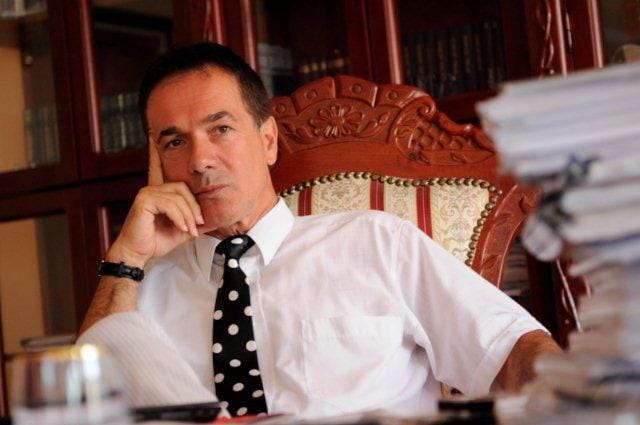The government of the Federation of Bosnia-Herzegovina (FBiH) has spent at least 12.5 million KM over the past 10 years on rent for offices and to buy a building and land in Mostar even though its own office space sits empty or is being used rent free by others. Many ministries and departments are tenants in buildings owned by the Islamic Community or businessmen with connections to the ruling parties.
Mostar is not an isolated case. BiH and FBiH authorities spend millions in taxpayer money every year that might instead go toward building or refurbishing government offices. The Republika Srpska (RS) solved the issue of accommodation by constructing a new governmental headquarters in Banja Luka and rents only a small amount of space. However, the RS government also spent nearly 175 million KM overall on their new building which led to an investigation by the BiH Prosecutor’s Office which is looking at why construction, furniture and fixtures all cost far more than contracted prices.
FBiH and RS budgets show that rental costs increased from 6.6 million KM in 2005 to 10.5 million KM in 2010. If this year’s budgets are not amended, the combined cost of leasing over the past six years will have amounted to 51.8 million KM.
State government bodies and agencies are planning to spend 10.5 million KM on rent this year.
Auditors have been warning officials for years about the losses incurred by rent. Government officials have on several occasions said that constructing their own buildings is not only a long-term, but also a cost saving solution. Nevertheless, they have not acted or in places have moved too slowly and made errors.
Bought a Building without Registering It
Some 10 years ago, the FBiH government bought a bigger part of a commercial building in downtown Mostar on Ante Starčević Street. It was built on government land by Inter-Invest, a company owned by Dinko Slezak aka Dika, a pre-war trader and the owner of a department store in Mostar. After the war, Slezak made money in the gambling, construction and property businesses.
‘The one who is strong, builds’, says Marina Deronjić, head of the Zooning and Construction Department in Mostar. She explained that Mostar was a divided and unregulated city at that time.
During 1999, Inter-Invest filed a request to legalize the already constructed building.
When reporters from the Center for Investigative Reporting in Sarajevo (CIN) asked Deronjić when the building was legalized and how much it cost, he said he did not know and that paperwork in the case was incomplete and haphazard. She promised to complete the file and make it available to CIN, but then stopped answering the reporters’ calls in September.
Slezak sold part of the building to the FBiH government which never registered it in its name. At the time, the construction firm did not have a building permit.
Haris Ihtijarević the head of the FBiH government’s Joint Affairs Department —which manages FBiH government’s real property —said he could not remember how much FBiH government paid exactly, but thought it was about 5 million KM. He said he was going to look the contract up and have it sent to reporters. After repeated requests, only the contract about the procurement of one office of 222.8 square meters was sent.
A contract was concluded in February 1999. It read that the FBiH Investment Bank—owned by the government—bought from Inter-Invest office for 657,260 KM. The office was supposed to be operational starting in June 1999.
The bank sold the office to the Joint Affairs Department afterwards, according to the July 17, 2000 contract.
Ihtijarević said that the contracts on purchase of other offices were deposited with the FBiH Ministry of Finances. Ministry officials said Ihtijarević had those contracts.
While government officials are passing the buck, there is a possibility that the FBiH government could lose a part of the building that houses 10 of its agencies. The government has never registered itself as the owner in the land register and Slezak owes millions of KM in debt to outside companies who might seek to have his property auctioned off including the government’s building.
According to the final and binding verdict of the cantonal court in Mostar from August 2009, Inter-Invest is bound to pay nearly 1.3 million KM to the German company Wirtgen International GmbH because of an unfulfilled contract. Combined with default interest rates of 12 percent annually—calculating from April 15, 2006—the debt of Slezak’s firm increased to more than 1.9 million KM.
Wirtgen’s lawyer, Nusret Mešić, requested that real property of Inter-Invest be sold at auction to cover the debt. Included in the firm’s list of real property to be auctioned is the building in the Street of Ante Starčević.
Ihtijarević rejected the possibility that the government could lose its part of the building because, he said, the government paid and Slezak took money. He said he didn’t know why the request for registration of ownership has never been filed.
We Pay For Others and Give Away What Belongs To Us
Eventually, Slezak’s building turned out to be too small to fit all the agencies, so in October 2005, the FBiH government leased three additional offices in Mostar. One was owned by the Islamic Community and others by private businessmen connected with the Party of Democratic Action (SDA) and the Croatian Democratic Union (HDZ). In 2009 alone, the FBiH government paid 838,694 KM for offices in the three buildings.
In 1,837 square meters of the Projektant building on the Street of Stjepan Radić, the FBiH government placed three agencies: the Ministry of Education and Science, the Ministry of Development, Entrepreneurship and Craft, and a branch of the FBiH Tax Authority. The building belongs to the Projektant, company privatized in 2001. HDZ contributor Marinko Rozić owns 66 percent of its shares.
Rozić used to be a shareholder and was a member of the management of Hercegovačka Bank at the time when the Office of High Representative (OHR) placed it under provisional administration because of the allegations of money laundering and embezzlement.
In the so-called Korzo building in the Street of Mostar Battalion, the government has housed the Ministry of Energy, Mining and Industry in 994 square meters. The co-owner of the building is lawyer Faruk Ćupina, an SDA member.

Photo by CIN
Ćupina said that everything was done in compliance with law and that at the time when the contract was concluded in 2005, he was not a member of SDA. He joined the party in 2008 as a candidate for the Mostar City Council.
A third building of 663 square meters was leased to the FBiH government by the Islamic Community and the Ministry of Traffic and Communications settled there. Ramiz Jelovac, an SDA member who also represented the Islamic Community in Mostar signed the lease agreement. Jelovac was re-elected in 2010 into the Assembly of Herzegovina-Neretva Canton.
Ihtijaravić signed all the lease agreements on behalf of the FBiH government.
The FBiH Auditors warned back in 2006 and ever since then that the high cost of leases was not justified because the government bodies should have a permanent headquarters in Mostar.
‘The state is an expensive plaything’ said Ihtijarević.
Land for 3 Million KM
In December 2007, the government bought 1,639 square meters of land for 3 million KM from a company whose majority owners were HDZ member Ante Vidačak and his relatives. The parcel included the ruins of the Hotel Herzegovina.
According to Danica Petrović of the FBiH Joint Affairs Department, the government is planning to build a commercial building of around 10,000 square meters where all its bodies and agencies based in Mostar would be housed.
The government appointed Vidačak at the end of 2008 to be president of the Supervisory Board of the FBiH Development Bank, and in April 2009 to be a member of the Supervisory Board of FBiH Directorate for Roads.
However, the government has been unable to start building for three years because of outstanding property claims. As a part of the former hotel, there were two apartments and an office which have been claimed by their owners.
Mostar’s Zoning and Construction Department issued the government a permit in 2010 to clear off the hotel debris but no construction can start until the ownership claims are cleared up. Auditors recommended that the government cancel the bill of sale in order to protect taxpayer money, which government hasn’t done.
Ihtijarević blamed the delay on the slow municipal administration in Mostar, not outstanding property claims. He said the government acquired the land from the city without a formal bidding process because the plot was adjacent to the ruins of the FBiH Railway building. Officials said that the combination of two plots would result in the property of 3,075 square meters, where a building would be constructed.
Land records OHR obtained this year, show that there is a building and a plot of land of 2,842 square meters in state ownership, just several hundreds meters from the location where the government bought the land for 3 million KM. Apart from this, more than 33,000 square meters of land located in downtown Mostar belongs to the government.
The Law Temporary Prohibition of Disposal of State Property of BiH bans the sale or transfer of ownership, but not the use of real property. However, while the government of FBiH in Mostar and Sarajevo has been paying expensive leases for years, the Joint Affairs Department has yet to complete the list of all real property that the government has at its disposal, despite the auditor’s recommendations.
Most of the offices have been used free-of-charge by private businessmen, associations and political parties. According to the 2009 auditor’s report, only 27 of 236 listed offices have leasing invoices.
Ihtijarević refused to give a list of FBiH owned property to reporters. He said that there was no comprehensive list, but many documents scattered at various locations.
Gavrilo Grahovac, the FBiH minister of Culture and Sports who was appointed president of a government commission charged with overseeing relocation of the agencies, said he saw no reason to meet with reporters from CIN.
Neither former Prime Minister Nedžad Branković, nor the current finance minister Vjekoslav Bevanda wanted to be interviewed on the subject.







